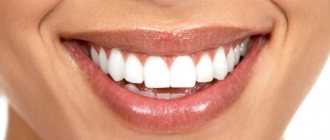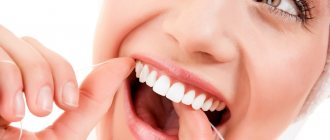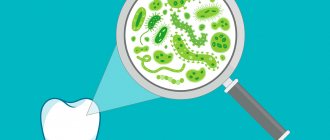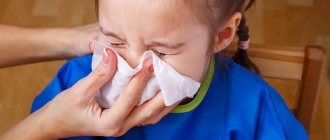There are happy parents and children who may not even notice how a new tooth has appeared in the child’s mouth. But still, more often than not, when teething, both the baby and the parents are equally worried and do not sleep at night. In some cases, the baby’s temperature can rise to 39 degrees; it is imperative to react to such a high temperature. Parents need to know what to do in such cases and when to use professional medical help without trying to self-medicate.
What causes fever to rise during teething?
Contrary to the popular belief of parents, an increase in temperature on the teeth is not the norm and does not always accompany teething. In this way, the baby’s fragile body responds to the occurrence of an inflammatory reaction in the gum, through which the first tooth makes its way. In this place, immune defense is reduced, microorganisms living on the mucous membranes are activated - this also provokes temperature surges.
This process is most difficult after a year, when fangs or molars are being cut, since the chewing teeth have several tubercles that cannot appear simultaneously and the process sometimes drags on for up to several weeks. The “eye” teeth are located slightly deeper than the others and must travel a longer path to the gum surface. Therefore, children usually experience quite severe discomfort and prolonged rises in temperature when they appear.
Sometimes fever during this period of life is a sign of an acute infection, which is due to reduced immunity. In this case, the body tries to protect itself from the invasion of viruses or bacteria and increases the temperature, which is destructive for pathogens.
What reaction is possible for a baby when teething?
What reaction can a child have when baby teeth appear? During this period, children may react in different ways:
- Some children tolerate this period quite normally. The only symptom that worries them is itching in the gums, increased salivation and a slight increase in body temperature.
- Other babies react very hard to teething: the temperature may rise to 38-39 degrees, they do not sleep at night, and refuse to eat.
- There are also little ones who are luckier than others: their teeth appear without any problems and almost imperceptibly.
What is the maximum temperature possible during this period?
How much the temperature rises when a baby’s teeth appear depends only on his individual characteristics. On average, this figure is 37.5-37.7 degrees. Sometimes this figure can reach 38 - this is also an acceptable value. It is important to take regular measurements, since infants do not regulate heat exchange well and as inflammation progresses, the temperature can increase very quickly.
A higher temperature (39-40 degrees) may indicate complications, the development of a respiratory tract infection and requires immediate medical attention.
What temperature is considered normal?
What parameters should you pay attention to? If the birth of the chewing organs is accompanied by a temperature that does not rise above 37.7 degrees, take it calmly. The temperature during the eruption of molars may be lower. It all depends on the complexity of this process. Minor deviations indicate that the units are being cut normally. Although the baby has become more restless, in such a situation this is natural behavior.
Give your body the opportunity to cope with problems on its own. If you intervene in this condition for no reason, the baby’s immunity will not be strengthened. Do not attempt to use medications. They are used when the temperature is high and lasts a long time. To improve your well-being, the following measures are taken:
- A comfortable and calm environment is created.
- Regular ventilation of the room is ensured.
- Providing adequate sleep and rest.
- A balanced diet and drinking regime are being established.
- Ensure heat exchange by removing clothing that restricts movement.
It is not recommended to introduce new dishes into the diet during this period. If a child has a malocclusion, he needs to be seen by a dentist. There is no point in delaying this. The sooner you notice the problem, the faster the treatment will take place and the more effective the result will be.
How many days does it last
In answering this question, it should again be recalled that all children are different and react differently to the appearance of teeth. On average, fever in babies can last 1-3 days and usually disappears immediately after teething.
But in the experience of many pediatricians, there are children whose high body temperature associated with the appearance of their first teeth lasted up to 4-5 days. Or there are cases when the fever lasts only a few hours and goes away without any intervention. In any case, you should not delay consulting a doctor, since if you have any diseases, identifying them earlier has a more favorable outcome.
Why does the temperature rise
Such a characteristic sign during the formation of masticatory organs as temperature occurs in 50-70% of children. It can appear every time teeth are cut, or maybe only in isolated cases. Most fathers and mothers face a “bouquet” of problems during the “birth” of teeth, including the appearance of hyperthermic syndrome. In fact, it is a shield for the active release of specific substances. To extinguish pathology, the body needs energy and resources. Provoking factors:
- The baby does not have fully formed life support systems, so they malfunction as soon as a provocateur appears.
- Heat exchange in the body is disrupted, which affects temperature indicators.
- Decreased appetite and sleep disturbance weaken the toddler’s body even after a year.
All this weakens the overall immune system. In such conditions, pathogenic microorganisms ideally multiply. To prevent this, body temperature rises. Therefore, the fact that the temperature has increased is quite natural. If there are no complications, there is no need to be afraid. But sometimes, when teeth appear, secondary diseases develop. This happens when the protective functions do not work and bacteria actively continue to multiply. Depending on where the infection is localized, the following ailments appear:
- Stomatitis or gingivitis
- Tonsillitis, adenoiditis or pharyngitis
- Laryngotracheitis or bronchitis
- Enteritis or dysbacteriosis
In order to clarify the reasons, you need to consult a pediatrician. If he recommends lowering the temperature during teething, then he will prescribe certain medications. The mother must constantly monitor the baby. It must be remembered that children react differently to deterioration in well-being. Therefore, parents should monitor their child’s behavior.
Other symptoms accompanying fever
During teething, there may be other symptoms in addition to fever. Swelling of the gums can spread from the oral cavity to the nasal mucosa, thereby causing a slight runny nose and the discharge of a slight transparent mucous secretion. This symptom is more pronounced when the upper teeth erupt.
The appearance of baby teeth is often accompanied by excessive salivation, especially when the lower teeth erupt. This also causes a slight loosening of the stool - the stool becomes a little softer than usual.
Symptoms of canine eruption
In order for parents to be able to determine that this is a child’s temperature during teething, and not a symptom of a disease, you need to know how children’s bodies most often react to tooth growth.
Regardless of whether there is a high temperature or not, copious amounts of saliva are always produced. Due to constant discomfort in the oral cavity, the child becomes capricious and irritable. Babies sleep very poorly during this period and often wake up at night crying loudly, after which they cannot calm down for a long time.
During the period of time when the baby’s fangs and other new teeth appear, the child begins to put absolutely everything into his mouth. To reduce the risk of a large number of bacteria getting into the stomach and oral mucosa, it is worth giving the baby special rubber toys. There are great options that can not only speed up teething, but also cool your gums. This has a fairly strong analgesic effect.
A sign that a child is teething can also be a deterioration in appetite. This is associated not only with high fever and deterioration in general health, but also with severe discomfort in the mouth. Sometimes redness appears on the child's face, which can be confused with an allergic reaction.
All this is a sign that the baby is teething. But often such symptoms become a manifestation of various diseases. Therefore, you should always be as careful and attentive as possible to the health of your child.
What should parents be wary of?
A child's body, weakened by teething, is very susceptible to bacterial or viral infection. Therefore, the baby’s symptoms may indicate complications:
- Severe nasal congestion , accompanied by copious discharge of purulent secretion. This suggests that on top of the usual swelling of the mucous membrane there is rhinitis, which must be treated.
- Loose stools . Fever and diarrhea together rarely accompany the appearance of teeth. This symptom may indicate the presence of some kind of intestinal infection, which the child could have introduced into the body with toys or gum teethers.
- Cough . With excessive salivation, children do not always have time to swallow saliva in time and sometimes choke on it, which causes periodic coughing. If the cough is systematic, accompanied by difficulty breathing or sputum discharge, then this speaks in favor of inflammation of the respiratory tract.
- Red throat . The inflammatory reaction that occurs in the gums during teething cannot spread to the mucous membranes of the throat. Redness of the palatine arches or pharynx is a sign of pharyngitis or acute respiratory infections.
- Vomiting often accompanies high body temperature in young children. But it may be a sign of damage to the nervous system or intestinal infection.
The presence of such signs requires urgent medical attention and appropriate treatment, regardless of what temperature (high or low) accompanies them.
How long does the temperature last
Gum inflammation in young children is a common dental disease. After all, children's mucous tissues are unprotected and delicate, and local protective forces are not yet fully operational. If the temperature jumps 39-40 degrees, consult a doctor immediately. Sometimes, at the time of the appearance of incisors, canines and molars, high body temperatures can last for several days.
If the high temperature returns to normal within three days, this is normal. But, there is prolonged hyperthermia. In this case, safety will be ensured by a pediatrician. He will be able to determine whether there is another reason for this phenomenon. When teething, the temperature can last a long time and go down badly. Therefore, you should not risk the child’s health; you should call a doctor in time. He will determine whether there is an infection, whether there is persistent swelling with hemorrhage on the gum. Perhaps such a clinical picture develops with the active birth of two masticatory organs at once.
Parental care and love works wonders! Involve your little one in the game more often. Take him in your arms. An upright position will relieve pain as it will reduce blood flow to the gums. Be patient! Do not let your baby scream or cry for a long time, this exhausts his nervous system.
Temperature during loss of primary teeth and eruption of permanent teeth
The replacement of baby teeth with molars is usually not accompanied by any temperature reactions. An exception may be chewing teeth, which have a large surface and cause significant inflammatory reactions in the gums.
In addition, an increase in temperature during teething in a fairly old child (6 years of age or more) may indicate the presence of gingivitis - a disease of the gingival mucosa, which can lead to serious consequences without treatment.
What to do when the temperature rises
Often parents, even with a slight fever, begin to actively treat the child with antiviral, antipyretic and antibacterial drugs. Even if this symptom is due to the appearance of the first teeth. Most pediatricians (including Dr. Komarovsky) are against such radical methods. Why shouldn't you do this?
A temperature of 37 degrees and above is a kind of protective reaction of the body and helps it more actively produce antibodies against viruses and bacteria. Low body temperature does not allow you to effectively fight infection. Therefore, sometimes it is worth not interfering with natural processes and immediately suppressing even minor signs of fever.
But you shouldn’t fall into inaction either. If the fever reaches significant numbers (38 degrees or higher) and is accompanied by a change in the general condition of the child, then prescribing antipyretic drugs for high fever is a primary measure.
If the rise in temperature is not controlled by conventional medications, then it is possible to scrub the child with cool water or an vinegar-alcohol mixture.
If the fever does not subside within 3 days, then you must definitely visit your treating pediatrician to decide on further examination and the possibility of prescribing antibiotics or other medications.
Some parents prefer homeopathy in such cases. Such drugs do not effectively reduce the temperature, but they can alleviate the baby’s general condition and speed up the recovery process. A prerequisite before taking homeopathic medicines is to consult a specialist.
Is it possible to walk with a child with a fever?
If the baby’s general condition does not suffer much during teething, and the temperature is not high and is well controlled by antipyretic drugs, then a walk may even be beneficial. The main thing is to dress your child according to the weather, try to stay away from other children (since you can easily catch an infection) and not tire your baby with active outdoor games.
If the fever reaches high levels and the child does not tolerate it well, then it is better to refuse a walk until the condition improves.
In any case, even if parents are sure that the increase in temperature is caused by teething, medical consultation is necessary. You should not self-medicate, since incorrect measures will not only not alleviate the baby’s condition, but can also harm his health.






